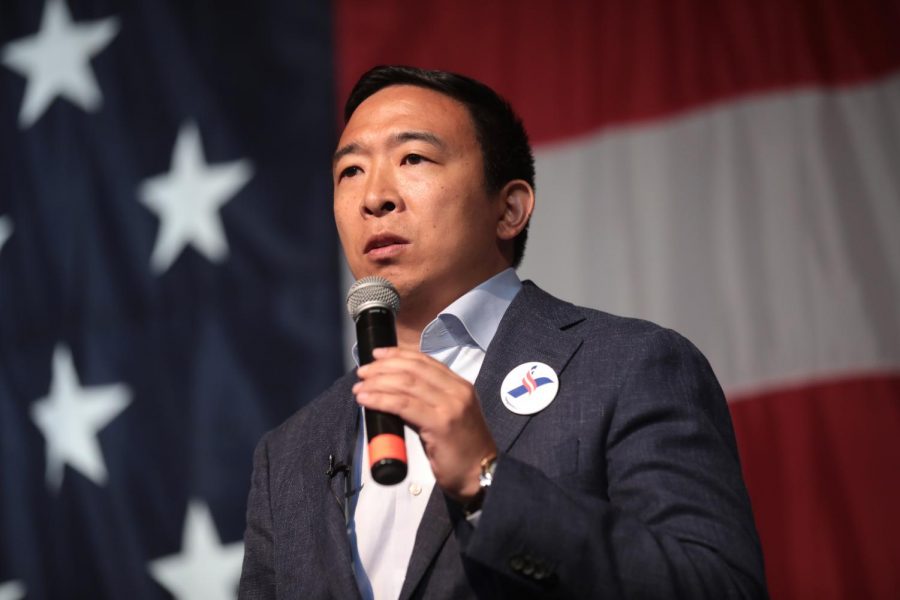Instead of Saving the Poor, Universal Basic Income May Only Cause More Suffering
Opinion
Gage Skidmore
Democratic presidential candidate Andrew Yang was the first among the candidates to announce his plan to implement UBI. The policy, named the Freedom Dividend, would provide every U.S. adult citizen with $1000 a month.
December 15, 2019
The conception of the idea of universal basic income (UBI), an entitlement program that would give all adults $1000 each month, in the U.S. mirrors that of universal healthcare. A mid-tier presidential candidate brings to the spotlight a plan inspired by those in some European nations. In the 2016 election, it was Bernie Sanders with universal healthcare. Now, in the 2020 election, it is Andrew Yang with UBI. But before we hold it up as the gold standard, we must weigh its potential benefits against the many issues it could face in action.
The main reason people support UBI is because of the positive impact they believe it could have on communities across the nation. Its proponents point to studies showing that communities that have implemented a small-scale version of UBI have seen economic benefits, while also allowing people more freedom in pursuing hobbies and leisure activities.
This is a valid argument, but it ignores potential pitfalls that UBI could encounter. All studies and experiments of UBI have been conducted at a local, not national, level. This is an important distinction as cities and states typically have their budgets supported by federal grants. There is also less stress on local budgets as they can use state subsidies and don’t have as many expenditures as the federal government, meaning that the increase in funds needed for UBI doesn’t impact municipalities as much as it would the federal budget. Federal spending also receives much higher levels of partisan scrutiny by the media and politicians than local spending. This would make federal funding for a national UBI more unstable because of possible budget cuts resulting from conflicts between political parties. There is also no indication that on a national level, UBI would be able to substantially ease the issues that the impoverished people in this country are facing.
In addition, UBI would spread our resources too thin. Remember, UBI doesn’t just give money to people below or near the poverty line, it gives money to everyone. This includes the top one percent, who the people that support UBI are quick to criticize as bloated with money and greedy. To say somebody is too wealthy and then give them $1000 a month through UBI is plainly hypocritical.
That wouldn’t even be the worst part of UBI. Due to the extraordinary costs that UBI would incur, many welfare programs that actually support the poorest Americans would have to be gutted and taxes would have to be raised on the middle class. This would be even after we liquidated the wealth of the top one percent to pay for this program. In the end, we would only be supporting a policy that hurts the lower and middle classes more than it helps them.
These issues haven’t even explored the feasibility of passing such a program in Congress. Unless Democrats can gain a majority in both the House and the Senate in 2020, such a bill would be almost guaranteed to fail due to a lack of strong support from both Republicans and Democrats. If anything, UBI would have to be heavily modified to appeal to moderates who are the key to passing the legislation.
The most noticeable changes to such a bill would most likely be restricting those eligible for benefits under the program to only lower and lower-middle-class families and individuals. These restrictions would greatly lower the cost of the program, but would fuel accusations by Republican lawmakers of Democrats giving people handouts because it would no longer be considered an entitlement program. Many who need the income could be cut out because they are no longer considered eligible. Meanwhile, the cost would still be high enough to warrant the removal of other safety nets provided to poorer individuals.
The only solution to poverty that will truly work in America is one that is not nearly as glamorous as UBI or universal healthcare: increasing investment in programs aimed at retraining and finding jobs for out-of-work people. The government also needs to increase funding for K-12 education and vocational training. These policies would give individuals the skills they need to be hired for well-paying jobs. Changing labor and pay regulations would also ensure that companies like Amazon or Walmart pay employees enough that they aren’t dependent on welfare.
UBI is a symptom of a larger problem, which is the Democratic platform and vision for this nation. Democratic lawmakers, in their haste to help workers and the impoverished, have forgotten that the easy solution is rarely the best solution. The goal should be easing people off of welfare programs, not making them more dependent on them. Until Democrats truly embrace this, America will only continue to see the federal budget balloon, wages plummet, and taxes rise.




